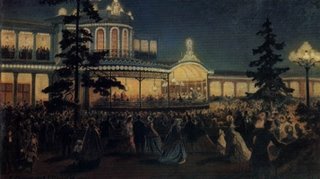
On Monday I was at a conference in Amsterdam. Between the discussions about internet security there was room for a more profound discussion. What is the origin of the Russian word вокзал (vokzal, railway station)?
My colleague had heard in St. Petersburg form a reliable source that вокзал was named after Vauxhall, the area in London where the London and South Western Railway was constructed in the 1840s. Allegedly the Russian delegation mistook the name of the borough for the name of a station or rather the name for a big hall was mistaken for that of a waiting room for trains.
As the Tsarkoe selo railway line was opened in 1837 the story about the Russian delegation visiting Vauxhall in 1840 seems unlikely (as mentioned in the English Wikipedia article)
3 comments:
Ben je er al achter?? Coen
Niet echt. Het lijkt erop dat de aanhangers van de twee theorieën van alle voors en tegens op de hoogte zijn. En helaas hielp mijn etymologisch Russisch woordenboek ook al niet...
De vraag die blijft is eigenlijk de volgende: heette het muziekpaviljoen indirect naar de Vauxhall Pleasure Gardens, of was het juist het Russische woord (vokalni zal, of vokalni salon) dat de naam gaf aan het paviljoen in Pavlovsk en daarmee aan alle grote stations?
Post a Comment